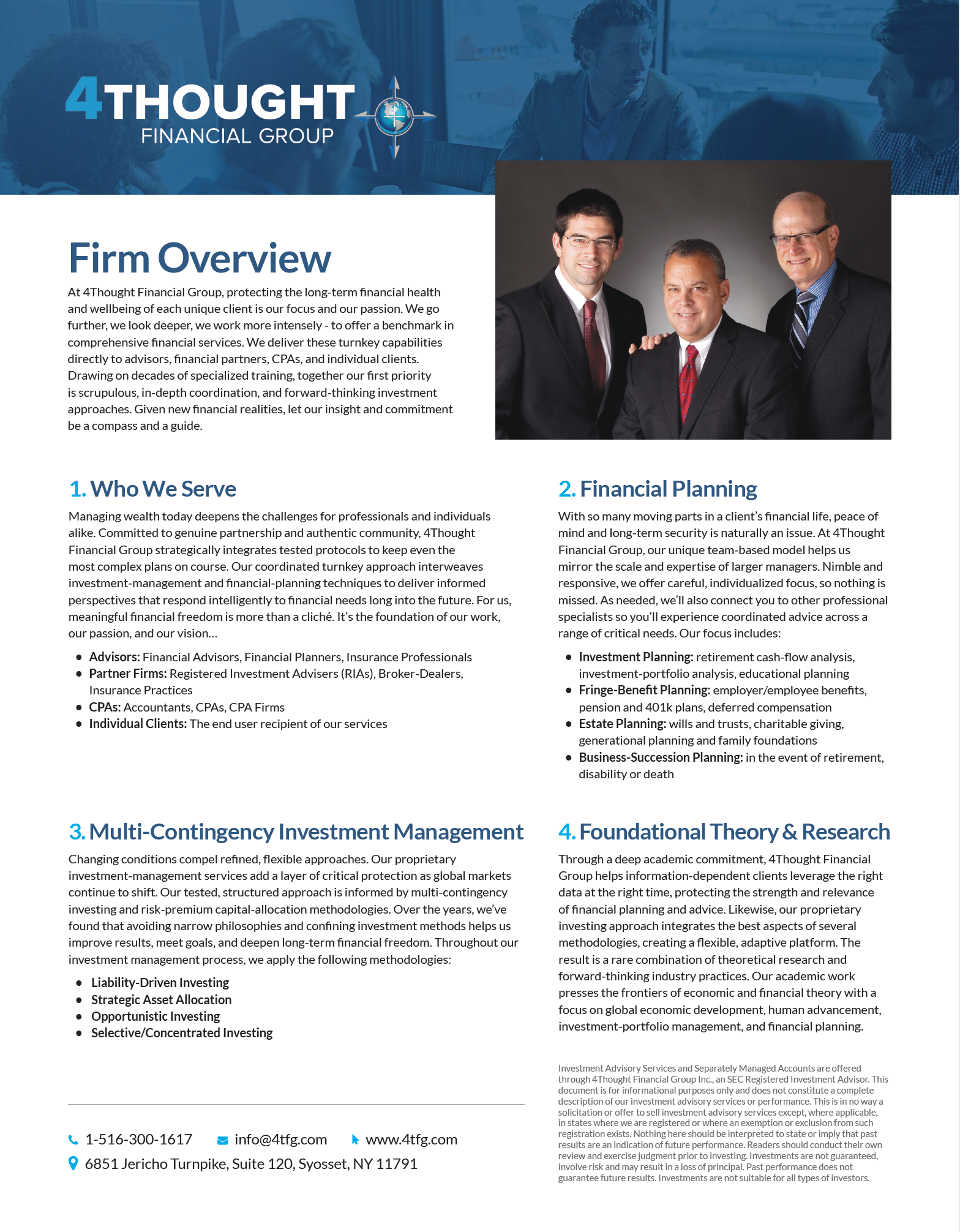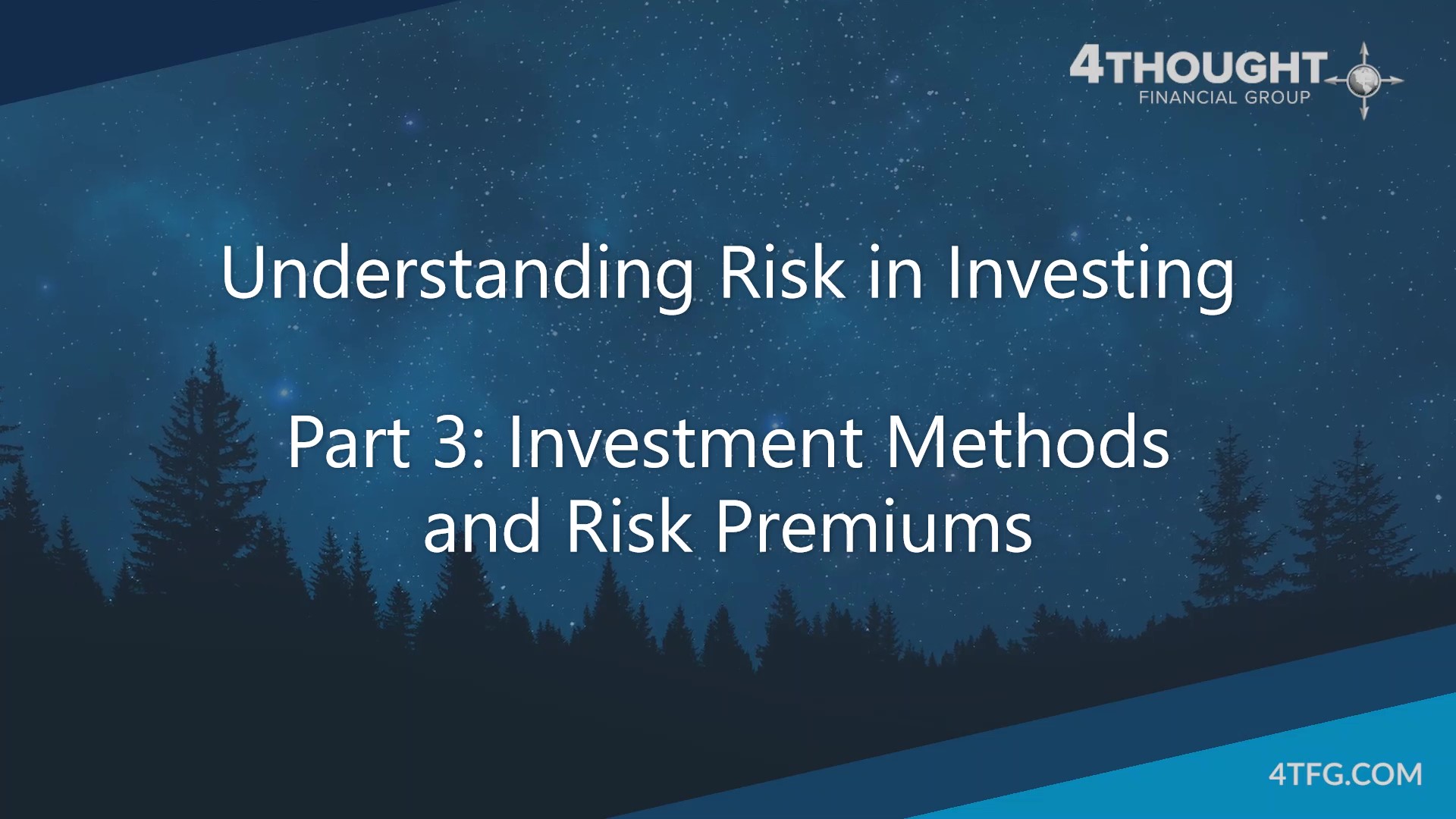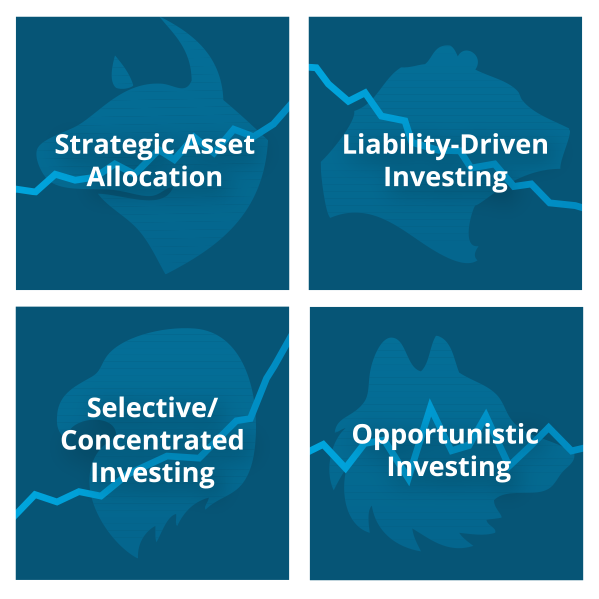

4Thought Financial Group Firm Overview
"Protecting the long-term financial health and wellbeing of each unique client is our focus and our passion. Drawing on decades of specialized training and experience, let our insight and commitment be a compass and a guide."
So, you want to invest, but you don't know where to start. It's a common issue for beginners, but it's easily solved with a little guidance and education. Once you know the basics, you can start cautiously investing, learning about more specific investments and techniques as you go. Here's a guide to investing for beginners, including some of the most popular first-time investment strategies.
Who Is an Investor?
An investor is different from a saver or a gambler. A saver simply hoards money because they're worried about losing it. The problem here is that savers aren't using their money, which is a terrible long-term strategy.
Gamblers are the opposite of savers. They use their money to play high-risk games, hoping for a payoff that isn't statistically likely to happen. This technique is arguably worse than saving because most gamblers end up broke.
Investors are the happy medium between these two extremes. Investors use their money to gain more money in the form of profits. Investments are usually much lower-risk than gambling, especially if you know what you're doing.
Note: If you're randomly buying stock without significant research, you're closer to a gambler than an investor.
How to Make Your First Investment
You can make your first investment however you like. You can buy stock. You can contribute capital for your friend's startup company. You can purchase real estate. However, most financial advisors recommend starting slowly with one of the most widely used investments around: mutual funds.
Why Mutual Funds?
Mutual funds aren't necessarily a "flashy" type of investment, but they may be more stable than simply buying individual stocks. With a mutual fund, you're actually pooling your money with other investors. Together, you all own a portfolio of various stocks, bonds and other securities. You'll own a share (or shares) of the fund, and the price of the share is determined by the value of the securities as well as the number of shareholders. Financial advisors often recommend mutual funds for the following reasons:
- They're managed by professionals. At this point, you don't know much about investing, so you need guidance. Mutual funds have that guidance built-in. The portfolio manager makes the day-to-day decisions for all the investors so you don't have to worry about your lack of investment knowledge.
- They're diversified. If you've heard anything about investing, it's probably "diversification." The biggest part of investing is diversifying your portfolio, which means investing in several different types of securities. Mutual funds are already diversified (at least by the number of securities if not the type), so some of the legwork is done for you.
- They're easy. Mutual funds are easy, and not just because they're set up and managed for you. They're also readily marketable and liquid, and you can sell them quickly should the need arise.
Where to Invest
Because mutual funds are so widely available, you have a few options for your purchase.
- Direct. You can buy mutual funds directly from most mutual fund companies. This may help you avoid fees charged by other financial intermediaries. You can also purchase stock directly from certain companies through Dividend Reinvestment Programs (DRIPs).
- Stock brokers. You can use a traditional stock broker who works on a commission basis and may be able to present you with a few options, but it's often much cheaper to use an online stock broker if you’d prefer to do the selecting yourself.
- Financial advisors and planners. People with large sums to invest usually use a financial advisor, but there are benefits for small investors, too. You'll get personal financial advice and service, though you'll pay a premium for it, in the form of an investment advisory fee or financial planning fee (in the case of fee-based or fee-only advisors).
- Apps. Yes, just like everything else, there are apps for investing. These usually don't allow a lot of input from you, but they're easy and simple to use. They often simply help you in the decision-making process, but do not necessarily help you with implementation (either functionally or in term of expenses).
- Robo-Advisors. These sites combine advising and/or portfolio management with brokerage. You simply answer a few questions and the site chooses your allocations for you, and the money is managed for you on an ongoing basis for a (relatively) low investment advisory fee.
What About Retirement?
Your retirement account is generally your first investment. If you're offered a retirement account with company match through your employer, that's the best place to start. After that, an IRA is your best option, though there's a choice to make here, too:
- Traditional IRA: Usually, you don't pay tax on your contributions to a traditional IRA. Instead, they're deferred until you withdraw the money later in life. You can potentially get a tax deduction on the contributions plus deferral of taxes on the growth that occurs in the future. This option is best if you assume you'll have a lower tax rate when you're retired than you do now.
- Roth IRA: With a Roth IRA, you contribute after-tax dollars now, but you won't pay taxes on your withdrawals later (or on the growth in the interim). This option is best if you assume you'll have a higher tax rate when you're retired than you do now.
- Rollover IRA: This term is used when you roll money from another type of retirement account into an IRA account. If you leave your current employer, you can roll money from your 401k to an IRA account without paying taxes (assuming the transaction is executed correctly).
For tax purposes, most financial advisors recommend a Roth IRA for your initial retirement account. For the majority of beginner investors, their tax rate will be higher in retirement than it is now, so it's best to pay lower taxes now than higher ones later. According to Kiplinger, a Roth IRA is "one of the smartest moves a young person can make."
Final Thoughts
Obviously, there's a lot more you can learn about investing, specifically when it comes to individual investments like stocks or bonds, other alternatives such as exchange traded funds. But most importantly, be sure to seek information on investor behavior do’s and don’ts, which will ultimately be the biggest determinants of your outcome. Consider seeking the aid of financial professionals for guidance in these areas.






Leave a Comment